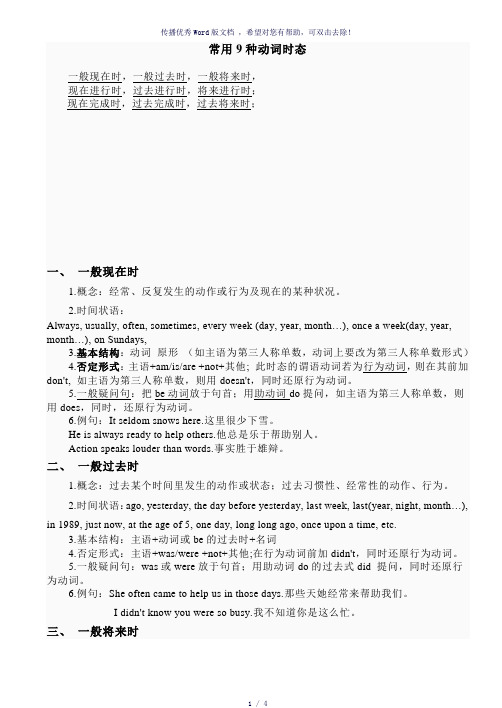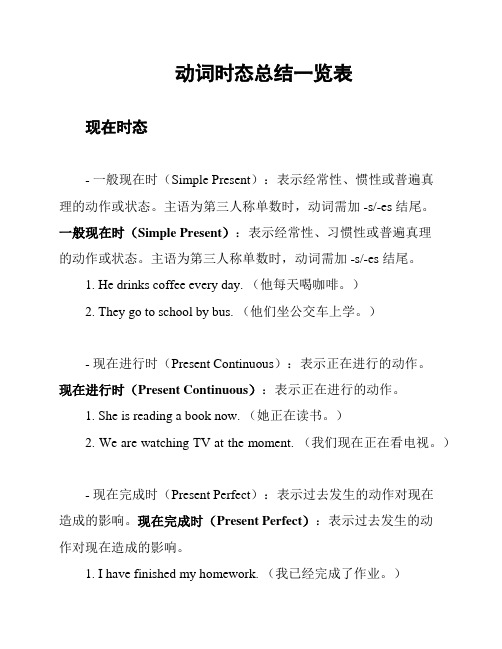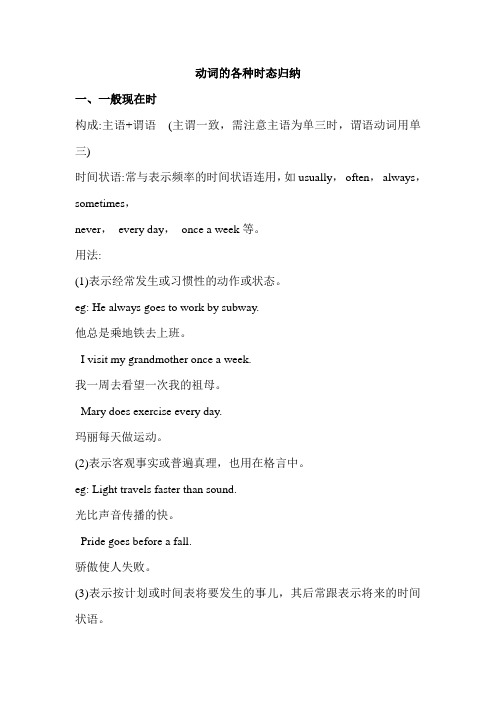动词时态总结
英语动词时态总结

英语动词时态总结一、一般现在时(Simple Present Tense)表示经常性动作、惯性动作、普遍真理等。
1. 动词原形:- I, you, we, they + 动词原形- He, she, it + 动词原形 + -s/-es2. 特殊用法:- 表示客观事实或普遍真理:The sun rises in the east.- 表示经常性或惯性动作:I often go for a run in the morning.二、一般过去时(Simple Past Tense)表示过去某个时间发生的动作或存在的状态。
1. 动词过去式:- 一般情况下,动词过去式在词尾加-ed。
- 不规则动词过去式需单独记忆。
2. 特殊用法:- 表示过去的经历或事件:We traveled to France last summer.三、一般将来时(Simple Future Tense)表示将来发生的动作或存在的状态。
1. will/shall + 动词原形:- I, you, he, she, it, we, they + will + 动词原形- I, we + shall + 动词原形2. 特殊用法:- 表示决定、承诺、意愿等:I will help you with your homework.四、现在进行时(Present Continuous Tense)表示现在正在进行的动作。
1. be(am/is/are) + 动词-ing:- I + am + 动词-ing- He, she, it + is + 动词-ing- You, we, they + are + 动词-ing2. 特殊用法:- 表示现在进行的动作:I am studying for the exam.五、过去进行时(Past Continuous Tense)表示过去某个时间正在进行的动作。
1. was/were + 动词-ing:- I, he, she, it + was + 动词-ing- You, we, they + were + 动词-ing2. 特殊用法:- 表示过去正在进行的动作:She was watching TV when I arrived.六、将来进行时(Future Continuous Tense)表示将来某个时间正在进行的动作。
小学英语语法动词时态总结

小学英语语法动词时态总结一、一般现在时态(Simple Present Tense)1. 表示经常性或习惯性的动作、状态或真理。
例句:She often goes swimming in summer. (她经常夏天去游泳。
)例句:The earth revolves around the sun. (地球绕太阳转。
)2. 表示客观事实或永恒真理。
例句:Water boils at 100 degrees Celsius. (水在100摄氏度沸腾。
) 例句:The sun rises in the east. (太阳从东方升起。
)3. 表示现在的状态、感觉、持续的行为。
例句:I live in Beijing. (我住在北京。
)例句:She loves playing the piano. (她喜欢弹钢琴。
)二、一般过去时态(Simple Past Tense)1. 表示过去某个时间发生的动作、事件或状态。
例句:He finished his homework yesterday. (他昨天完成了作业。
) 例句:They visited their grandparents last summer. (他们去年夏天拜访了他们的祖父母。
)2. 表示过去的习惯或经常性的动作。
例句:She always wore a hat when she went out. (她出门时总是带着帽子。
)例句:They often played football after school. (他们放学后经常踢足球。
)第1页/共5页3. 表示过去的真理或现状。
例句:He thought the earth was flat. (他认为地球是平的。
)例句:The dinosaurs became extinct millions of years ago. (恐龙在几百万年前灭绝了。
)三、一般将来时态(Simple Future Tense)1. 表示将要发生的动作或事件。
动词时态-常用9种

常用9种动词时态一般现在时,一般过去时,一般将来时,现在进行时,过去进行时,将来进行时;现在完成时,过去完成时,过去将来时;一、一般现在时1.概念:经常、反复发生的动作或行为及现在的某种状况。
2.时间状语:Always, usually, often, sometimes, every week (day, year, month…), once a week(day, year, month…), on Sundays,3.基本结构:动词原形(如主语为第三人称单数,动词上要改为第三人称单数形式)4.否定形式:主语+am/is/are +not+其他; 此时态的谓语动词若为行为动词,则在其前加don't, 如主语为第三人称单数,则用doesn't,同时还原行为动词。
5.一般疑问句:把be动词放于句首;用助动词do提问,如主语为第三人称单数,则用does,同时,还原行为动词。
6.例句:It seldom snows here.这里很少下雪。
He is always ready to help others.他总是乐于帮助别人。
Action speaks louder than words.事实胜于雄辩。
二、一般过去时1.概念:过去某个时间里发生的动作或状态;过去习惯性、经常性的动作、行为。
2.时间状语:ago, yesterday, the day before yesterd ay, last week, last(year, night, month…),in 1989, just now, at the age of 5, one day, long long ago, once upon a time, etc.3.基本结构:主语+动词或be的过去时+名词4.否定形式:主语+was/were +not+其他;在行为动词前加didn't,同时还原行为动词。
5.一般疑问句:was或were放于句首;用助动词do的过去式did 提问,同时还原行为动词。
动词时态详解

动词时态详解动词时态是指动词表示的动作或状态所发生的时间。
在英语中,有多种不同的时态,每种时态都有其独特的用法和含义。
以下是对一些常见动词时态的详细解释:1. 现在时态 (Present Tense)- 一般现在时 (Simple Present): 用于表达经常性的动作、客观事实、普遍真理等。
- 现在进行时 (Present Continuous): 用于表示正在进行的动作。
- 现在完成时 (Present Perfect): 用于表示过去发生的动作与现在的关系,强调结果或经验。
- 现在完成进行时 (Present Perfect Continuous): 用于表示过去开始并一直持续到现在的动作。
2. 过去时态 (Past Tense)- 一般过去时 (Simple Past): 用于表达过去发生的动作或状态。
- 过去进行时 (Past Continuous): 用于表示过去某一时刻正在进行的动作。
- 过去完成时 (Past Perfect): 用于表示过去某一动作或状态在另一过去时间点之前发生。
- 过去完成进行时 (Past Perfect Continuous): 用于表示过去某一时间点之前已开始并持续到另一时间点的动作。
3. 将来时态 (Future Tense)- 一般将来时(Simple Future): 用于表示将来发生的动作或状态。
- 将来进行时 (Future Continuous): 用于表示将来某一时刻正在进行的动作。
- 将来完成时 (Future Perfect): 用于表示将来某一时间点之前已经完成的动作。
- 将来完成进行时 (Future Perfect Continuous): 用于表示将来某一时间点之前已开始并持续到另一时间点的动作。
以上是关于常见动词时态的简要说明。
对于每种时态,还有其他细节和规则需要进一步了解和掌握。
在使用动词时态时,确保根据具体语境和需要选择合适的时态,以便准确地表达你的意思。
动词时态总结一览表

动词时态总结一览表现在时态- 一般现在时(Simple Present):表示经常性、惯性或普遍真理的动作或状态。
主语为第三人称单数时,动词需加 -s/-es 结尾。
一般现在时(Simple Present):表示经常性、习惯性或普遍真理的动作或状态。
主语为第三人称单数时,动词需加 -s/-es 结尾。
1. He drinks coffee every day. (他每天喝咖啡。
)2. They go to school by bus. (他们坐公交车上学。
)- 现在进行时(Present Continuous):表示正在进行的动作。
现在进行时(Present Continuous):表示正在进行的动作。
1. She is reading a book now. (她正在读书。
)2. We are watching TV at the moment. (我们现在正在看电视。
)- 现在完成时(Present Perfect):表示过去发生的动作对现在造成的影响。
现在完成时(Present Perfect):表示过去发生的动作对现在造成的影响。
1. I have finished my homework. (我已经完成了作业。
)2. They have lived here for two years. (他们在这里住了两年了。
)- 现在完成进行时(Present Perfect Continuous):表示动作从过去一直延续到现在。
现在完成进行时(Present Perfect Continuous):表示动作从过去一直延续到现在。
1. They have been playing basketball for two hours. (他们已经打了两个小时的篮球了。
)2. I have been studying English for five years. (我已经研究英语五年了。
)过去时态- 一般过去时(Simple Past):表示过去某个时间发生的动作或状态。
16种动词的时态和语态

【主动语态】一般现在时:do一般过去时:did一般将来时:willdo现在进行时:be doing(be随人称变化)过去进行时:was/weredoing现在完成时:have/has done过去完成时:had done过去将来时:woulddo将来完成时:will have done将来进行时:will be doing将来完成进行时:will have been doing现在完成进行时:have been doing过去将来完成时:would have done过去完成进行时:had been doing过去将来进行时:would be doing过去将来完成进行时:would have been doing【被动语态】一般现在时:be done(be随人称变化)一般过去时:was/were done一般将来时:will be done现在进行时:be being done(前面的be随人称变化,后面的being固定)过去进行时:was/were being done(being固定)现在完成时:have/has been done过去完成时:had been done过去将来时:would be done将来完成时:will have been done将来进行时:will be being done(being固定)将来完成进行时:will have been being done现在完成进行时:have been being done过去将来完成时:would have been done过去完成进行时:had been being done过去将来进行时:would be being done过去将来完成进行时:would have been being done。
动词的各种时态归纳(含例句及解析)

动词的各种时态归纳一、一般现在时构成:主语+谓语(主谓一致,需注意主语为单三时,谓语动词用单三)时间状语:常与表示频率的时间状语连用,如usually,often,always,sometimes,never,every day,once a week等。
用法:(1)表示经常发生或习惯性的动作或状态。
eg: He always goes to work by subway.他总是乘地铁去上班。
I visit my grandmother once a week.我一周去看望一次我的祖母。
Mary does exercise every day.玛丽每天做运动。
(2)表示客观事实或普遍真理,也用在格言中。
eg: Light travels faster than sound.光比声音传播的快。
Pride goes before a fall.骄傲使人失败。
(3)表示按计划或时间表将要发生的事儿,其后常跟表示将来的时间状语。
The plane takes off at four PM.飞机下午4点起飞。
When does the school begin?学校什么时候开学?(4)表示主语现在的特征性格或状态。
Jenny loves music.珍妮喜欢音乐。
She lives in a small apartment.他住在一套小公寓里。
(5)一些表示心理意识的动词,如know,understand,remember等无进行时,只能用一般现在时表示现在发生的具体行为。
eg: I still remember the frightening experience on the island.我仍然记得在那个岛上的可怕经历。
(6)在时间和条件状语从句中代替一般将来时。
eg: I'll think about it when I write my report.我写报告时会对此予以考虑的。
If he comes, I'll let you know as soon as possible.如果他来的话,我会尽快让你知道。
动词16种时态形式一览表

动词16种时态形式一览表动词是表示动作、行为、状态或存在的词语。
它们根据具体时间的不同变化形成不同的时态。
一共有16种时态,分为现在时态、过去时态和将来时态。
现在时态有4种形式:一般现在时、现在进行时、现在完成时和现在完成进行时。
一般现在时表示经常发生的动作、行为或客观事实,通常与副词always、often、usually等连用,也可与时间状语连用。
例如:I play basketball every Sunday.(我每个星期天打篮球。
)现在进行时表示正在进行的动作或当前的状态,由be动词和动词的现在分词构成。
例如:She is studying for the exam.(她正在为考试复习。
)现在完成时表示过去发生的动作对现在造成的影响或结果,由have/has + 过去分词构成。
例如:We have visited the museum.(我们参观过博物馆。
)现在完成进行时表示过去一段时间内一直持续进行的动作,由have/has + been + 动词的现在分词构成。
例如:He has been working on this project for two months.(他已经工作在这个项目上两个月了。
)过去时态有4种形式:一般过去时、过去进行时、过去完成时和过去完成进行时。
一般过去时表示过去某个时间发生或存在的动作、行为或状态,常与表示过去的时间状语连用。
例如:I went to the park yesterday.(昨天我去了公园。
)过去进行时表示过去正在进行的动作或状态,由过去式的be动词和动词的现在分词构成。
例如:She was sleeping when I called her.(我给她打电话的时候,她正在睡觉。
)过去完成时表示过去某个时间或动作之前已经完成的动作,由had + 过去分词构成。
例如:They had already left when I arrived.(当我到达时,他们已经离开了。
- 1、下载文档前请自行甄别文档内容的完整性,平台不提供额外的编辑、内容补充、找答案等附加服务。
- 2、"仅部分预览"的文档,不可在线预览部分如存在完整性等问题,可反馈申请退款(可完整预览的文档不适用该条件!)。
- 3、如文档侵犯您的权益,请联系客服反馈,我们会尽快为您处理(人工客服工作时间:9:00-18:30)。
判断下列句子的时态:1. Is the Grand Canyon the greatest wonder anywhere in the natural world?2. She sings with the band Crazy Feet.3. We’re having a meeting.4. She went to our school!5. It was raining.6. I’ve written down some ideas.7. I’ll do an interview with Becky Wang!注意:动词have的第三人称单数是.写出下列动词的单数第三人称形式。
1.cook______2.watch______3.build______4.have_____5.wash____6.enjoy_____7.go _____8.receive_____9.cry_____10.close_____11.drive____12.choose____ 13.play____14. reach _______4.否定形式:,如主语为第三人称单数,则用5.一般疑问句:,如主语为第三人称单数,则用,同时,还原行为动词。
6. 巩固练习:1、Lucy likes going skating with her friends. (改否定句)2、His watch costs 300 yuan. (变成一般疑问句并否定回答)3、I like being a nurse for the old. (变成一般疑问句)4、She is from Beijing.(改否定,一般疑问句并肯定回答)二、一般过去时:1.概念:过去某个时间里发生的动作或状态;过去习惯性、经常性的动作、行为。
2.时间状语:ago, yesterday, the day before yesterday, last week(year, night, month…), in 1989, just now, at the age of 5, one day, long long ago, once upon a time, etc.注:不规则动词过去式参见八年级下册P142。
写出下列动词的过去式形式。
1.drink ______2. cry ______3. pull _______4 ride ________5. take ________6.sweep _______7. stop _____ 8 solve _______9. rob _______10. wait _________11. lie _________12. turn _______13. explore _______ 14. drop _______15. clean ______16. produce _____1ugh_________18.prefer ______4.否定形式:5.一般疑问句:6.巩固练习(改否定和疑问句):1、Yesterday I went swimming.写出下列动词的现在分词形式。
1、win2、relax 3、jump 4、make4.否定形式:5.一般疑问句:6.巩固练习:(1)Bruce often writes letters in English. (用now改写句子)(2)They are surfing.四、过去进行时:1.概念:表示过去某段时间或某一时刻正在发生或进行的行为或动作。
2.时间状语:at this time, yesterday, at that time或以when引导的谓语动词是一般过去时的时间状语等。
When he came in, I was reading a newspaper.3.基本结构:4.否定形式:5.一般疑问句:五、现在完成时:1.概念:过去发生或已完成的动作对现在造成的影响或结果,或从过去已开始,持续到现在的动作或状态。
2.时间状语:recently, lately, since…,for…,in the past few years, etc.3.基本结构:过去分词的规则变化与动词过去式的变化相同,在动词词尾加-ed;不规则变化的过去分词见课本.4.否定形式:5.一般疑问句:6.比较一般过去时与现在完成时一般过去时表示过去某时发生的动作或状态,强调动作,不和现在发生联系,常与具体的过去时间状语连用,如yesterday, last week,…ago, in1980, in October, just now等,;现在完成时表示过去发生的某一动作对现在造成的影响或结果,强调的是现在的情况,不能与表过去的时间壮语连用。
I saw this film yesterday. (强调看的动作发生过了)I have seen this film. (强调对现在的影响,电影的内容已经知道了)六、过去完成时:1.概念:以过去某个时间为标准,在此以前发生的动作或行为,或在过去某动作之前完成的行为.By the end of last month. We had reviewed four books.As soon as we got to the station, the train had left.2.时间状语:before, by the end of last year(term, month…),etc.3.基本结构:4.否定形式:5.一般疑问句:七、一般将来时:1.概念:表示将要发生的动作或存在的状态及打算、计划或准备做某事。
2.时间状语:tomorrow, next day(week, month, year…),soon, in a few minutes, by…,the day aftertomorrow, etc.3.基本结构:4.否定形式:5.一般疑问句:八、过去将来时:1.概念:立足于过去某一时刻,从过去看将来,常用于宾语从句中。
He said he would go to Beijing the next day.2.基本结构:3.否定形式:4.一般疑问句:练习一.单项选择1 . My sister ____ the Youth League last year.She ____ a Youth League member for about a year now.A. joined…has beenB. has joined…has beenC. did join…had been2. They _____ supper when we went into the room.A. are havingB. were havingC. was having3. Nathan Hale said he ____ his life for his country. A. gives B. will give C. would give4. My father ____ his cap and went out. A. put on B. puts on C. will put on5. Peter _____ the work in a week. A. have finished B. finishes C. will finish6. By the end of last term, we _____ Book Five.A. have learnedB. would learnC. had learned7. He can’t go to the ci nema with me because he ____ a meeting.A. was havingB. would haveC. is having8. Both of the two dictionaries ____ very useful. A. are B. is C. was9. He _____ to me since last month.A. didn’t writeB. hadn’t writtenC. hasn’t written10. At the age of eleven, my grandfather _____ to work in a factory.A. beganB. will beginC. begins11. Betty ____ morning exercises yesterday. A. not d id B. don't do C. didn’t do12. Mike usually ____ up at six in the morning. A. get B. gets C. got13. The sun _____ us light and heat. A. give B. gives C. will give14. At that time , things _____ hard for the working people. A. is B. are C. were15. Long long ago, there ____ a farmer in a small village. A. live B. will live C. lived16. --- Could you show me the way to No.5 Middle School?----I’m afraid I couldn’t. I ____ never _____ there.A. did…goB. have…beenC. had …been17. I ____ the boy in the classroom just now . A. see B. saw C. have seen18.He is going to be a doctor when he _____. A. grow up B. grows up C. will grow up19. Grandma said she would tell me a story when she _____.A. has timeB. had timeC. would have time20. My little sister ____ six next month. A. will be B. shall be C. is going to21. Go down the street and turn right at the first crossing . You _____ our school.A. findB. will findC. shall find22. Work hard, and you ____ catch up with the others. A. can be B. will C. shall23. Look! Tom ____ in the river. A. swims B. was swimming C. is swimming24. His sister __ ___ cakes. That’s why her hands are all covered with flour (面粉).A. makesB. madeC. is making25. What ____ you ____ this time yesterday ? A. do…do B. are…doing C. were…doing26. The train will arrive _____. A. for an hour B. in an hour C. an hour ago27. How may English films ____ since last year ?A. do you seeB. did you seeC. have you seen28. _____ the film yet ? Yes. I ______ it just now.A. Have you seen…sawB. Did you see…have seenC. Have you seen…have seen29. Her grandma ____ for five years. A. has been dead B. has died C. was dead30. Have you ____ heard the story about Edison ? A. ever B. never C. even31. Did you give a ticket to Li Hua yesterday ? No, Because she ____ for herself.A. bought oneB. has bought oneC. had bought one32. The day after tomorrow ____ my birthday. A. will be B. should be C. may be33.I’ve worked in the factory ____.A. in three yearsB. before three yearsC. since three years ago34. We ____ about you just now. A. are talking B. were talking C. talk35. Liu Ping said she ____ to my house tomorrow. A. will come B. would come C. came36. My brother ____ in the paper factory since he ____ college three years ago.A. had worked…leftB. has worked…leftC. had worked…was leaving37. Our maths teacher ____ the post office when I _____ him.A. was passing…sawB. passed…was seeingC. passed…had seen38. He asked me whether I ____ the play before. A. have seen B. will see C. saw39. The rain stopped ten minutes _____. A. ago B. before C. after40. Mr. Black has sold his car. He _____ a new one. A. is going to buy B. is buying C. buys41. Your mother _____ you at the gate. A. waits for B. wait for C. is waiting for42. Mr. Black isn’t in. But he ____ at home at about seven tonight.He usually ____ back from work at a quarter to seven.A. will be…will comeB. is …will comeC. will be…comes43. I’m looking for my watc h. I ____ it a moment ago. A. was lost B. lost C. have lost44 By the end of last year he about 1500 English words.A. learnsB. learnedC. had learned.45. Listen ! Someone in the next room . A. cried B. crying C. is crying46. He told me that he to see us the next day. A. would come B. came C. will come47. He often his clothes on Sundays. A. washing B. washes C. has washed48. May to school. A. never walks B. is never walking C. walk never49. We will start as soon as our teacher . A. comes B. will come C. come50. I think this question to answer. A. easy B. is easy C. was easy51. Don’t talk so loudly . Your father A. sleeps B. is sleeping C. slept52. I from my brother for a long time.A. not have heardB. have not heardC. have heard not53. Our teacher to Beijing three times. A. went B. has been C. has gone54. He the picture on the wall. A. hanged B. hung C. has hanged55. You her again in a few weeks. A. will see B. have seen C. had seen56. When we arrived , the dinner .A. already beganB. has already begunC. had already begun57. Oh, dear Xiao Hong . I you in Nanjing.A. don’t know , areB. didn’t know , wereC. didn’t know , are58. The teacher told us that the sun bigger than the earth. A. is B. was C. has been59. Could you tell me where the railway station ? A. was B. is C. will be60. You must study hard if you want to fail the exam. A. won’t B. don’t C. haven’t二.用所给词的适当形式填空:1 He swimming in the river every day in summer. (go)2.It you are right. ( seem )3.Look, the children basketball on the playground. ( play )4.He to the radio when I came in, ( listen )5.It is very cold .I think it . ( rain )6. —I need some paper . —I some for you . ( bring )7.I can’t find my pen . Who it ? ( take )8.He said that he back in five minutes . ( come )9.I didn’t meet him. He when I got there. ( leave )10.I my bike, so I have to walk to school. ( lose )11.He down and began to read his newspaper. ( sit )12.He is not here. He to the post office. (go)13.He is very hungry. He anything for three days. ( not eat )14.I with you if I have time . ( go )15.We won’t go to the cinema if it tomorrow . (rain )16.I will tell her the news when she to see me next week. (come)17. “ When you the car ?” “ In 1998 . ”( buy )18.We good friends since we met at school . (be)19.What you at five yesterday afternoon ? (do)20.The bike is nice . How much it ? (cost)。
